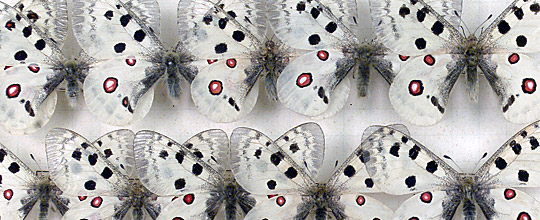Permanent exhibition
The Phyletisches Museum takes a broad look at the phylogenetic development of life. The ground floor is divided into the Medusensaal (Medusa Hall) and the Evolution Hall, while the first floor explores the phylogenetic development of organisms.
The Medusa Hall takes its name from the large, colourful frescoes of cnidarians (corals, sea anemones and jellyfish)which adorn the ceiling. The paintings date from 1908 and were restored in 1996. This room accommodates the special exhibitions, which change on a regular basis. Exhibits are displayed in the museum’s original glass cabinets.
The Evolution Hall explores important issues in evolutionary biology. Evolutionary theory and the genetic background of evolution are explained, and speciation is illustrated on the example of cichlid radiation in Lake Tanganjika. Other subjects featured include the domestication of the pigeon, the rapid evolution of the Human Immunodeficiency Virus (HIV) and the impact of sexual selection on the appearance and behaviour of animals. The »fossil bull« (Bos primigenius) found and described by Goethe is also on display here.
The four halls on the first floor trace the phylogenetic development of organisms from the origin of life to the diversity of species found today. Relationships within the animal kingdom are illustrated on the basis of both recent animals and fossils. A whole hall is dedicated to the phylogeny of man.



